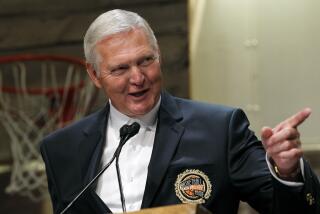West’s indelible hero
- Share via
Let’s begin with the understatement of the century in sports: Jerry West is a complicated guy.
Thursday night at Staples Center, in a prelude to NBA All-Star festivities, they honored him by unveiling a statue of his likeness. Thursday morning at Riviera Country Club, where he is serving as executive director of the Northern Trust Open, he squirmed and grimaced at the thought of it.
He called himself “an average guy,” which he is not. He said he’d rather “not be in the newspapers,” which is unavoidable for one of the great basketball players of all time, who also is well known for never failing to return reporters’ phone calls. He said his one wish for the evening ceremony was that his former Lakers teammate would be in a statue alongside.
“Elgin Baylor should be there,” he said.
Fame and fortune don’t drive Jerry West, even though he has lots of both. The demons of his youth, and the rough road to his success, are still behind the wheel. This fall, a book about his life will come out and it may become a textbook for psychologists.
West is 72. He said he is in “a very reflective stage of my life.” He said the book is a “dark book” that will be “very critical of me.”
But there is at least one constant with West that will never leave, never change and never stop affecting how he thinks and acts. It is the memory of his brother, David, and the anguish over David’s death.
He talks more about this personal hell these days because he knows it will all be out there soon, in great detail, in the “dark book.” Thursday morning, hours before they unveiled the Jerry West statue, he talked about which of the six children of Howard and Cecil Sue West of Chelyan, W.Va., most deserved to be bronzed.
Older brother David West was 22 -- 10 years older than skinny, insecure Jerry -- when he was killed in combat in the Korean War.
“He was religious, almost a perfect person,” West said.
“It was a small town, where we lived. Everybody knew him. He was 19 when he went into the military. I never heard one person say a bad word about him.”
West said David was “the apple of my mother’s eye.” He said that it was David, more than anybody else, who kept him going, encouraged him to study, to keep playing basketball, even though West was so small early in his teens that he had to take vitamin shots.
“I was a kid with a lot of imagination,” West said. “I’d go fishing and always pretend I would catch the biggest fish. I’d stay out there for hours after everybody else left until I caught something. When I shot baskets, I was always the coach and star player and always made the winning shot.”
He was also a determined and defiant kid, he said, one needing the discipline and role model of a big brother.
“He was playing basketball with his friends one day,” West recalled of his brother. “They were lots older than me, but I wanted to play. I told David that. Then I demanded, and used crude language. He threw the ball at me and hit me. Then he told me never to talk like that again.”
The terrible news came on a winter day in 1950. The West family didn’t have a car, so young Jerry ran everywhere.
“I ran to the post office,” he said, “and was running back home when somebody stopped me and said they heard my brother had been killed in Korea. I started running again, and when I got to within 200 yards of my house I could hear my mother, wailing and pounding on the walls.
“I was shocked to see what this did to her. It changed me forever. I went from being a fairly responsive kid to I didn’t speak. I became a loner.”
They buried David on “a cold December day.” They played “Taps,” and Jerry West says that every time he hears it now, he is taken back to that day and that cemetery.
After that, he said, “My mother was never the same.”
He said that “one of the cruelest things” he’d ever experienced were letters that kept arriving from David after his death.
“They kept coming for three months,” he said.
One of West’s sons is named David. At West Virginia University, where Jerry was an All-American, there is a David West Learning Center, with 80 computers and plenty of tutors. It was gifted by Jerry.
Near the 10th green at Riviera, there is another monument to David West that doesn’t carry his name, just the thoughts of his younger brother. It is a new initiative of sponsoring Northern Trust, the Annenberg Foundation and its handpicked executive director. It is called the Patriots’ Outpost, where all military personnel and families can enjoy hospitality after being admitted to the tournament for free.
Last summer, on the 60th anniversary of the start of the Korean War -- and the year of his brother’s death -- West joined a tour of dignitaries, including former President George W. Bush, in South Korea. One of the stops was a memorial that listed the names of the nearly 46,000 U.S. military people who had died there.
That brought an obvious question and, for once, an uncomplicated answer.
Did he go and find his brother’s name?
“Oh, yes,” said Jerry West.
More to Read
Go beyond the scoreboard
Get the latest on L.A.'s teams in the daily Sports Report newsletter.
You may occasionally receive promotional content from the Los Angeles Times.











